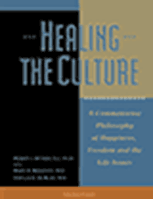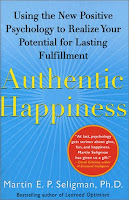Positive
Psychology
I ran across
an interesting article in Our Sunday Visitor (OSV) on positive psychology.
Positive psychology is the study of happiness. Psychology traditionally focused
on dysfunction—on people with mental illness or other psychological problems
and how to treat them. Positive psychology, by contrast, is a relatively new
field that examines how ordinary people can become happier and more fulfilled.
As a Franciscan, we are the people of
Franciscan joy, this interested me. The article focused on the four levels of
happiness presented in “Healing the Culture” by Fr. Robert J. Spitzer, a
Jesuit. Now I won’t hold that against him, though one would think this topic
belonged to a Franciscan.
The four
levels are:
- Bodily Pleasure. Food, drugs, sex. (L1)
- Competitive Advantage. (L2)
- Loving and Serving Other People. (L3)
- Loving and Serving God. (L4)
Before I
expand on the four levels I’ll turn to an article in Psychology Today. It says, “Positive psychology is the scientific study of what makes life
most worth living. It is a call for psychological science and practice to be as
concerned with strength as with weakness; as interested in building the best
things in life as in repairing the worst; and as concerned with making the
lives of normal people fulfilling as with healing pathology.” In my twenties I
subscribed to this magazine as I was interested in how I and others tick. I
think this branch of psychology has taken a great leap. The article goes on to
list the following as to what has been learned recently:
• Most people are happy.
• Happiness is a cause of good things in life and not simply along for the happy ride. People who are satisfied with life eventually have even more reason to be satisfied, because happiness leads to desirable outcomes at school and work, to fulfilling social relationships, and even to good health and long life.
• Most people are resilient.
• Happiness, strengths of character, and good social relationships are buffers against the damaging effects of disappointments and setbacks.
• Crisis reveals character.
• Other people matter mightily if we want to understand what makes like most worth living.
• Religion matters. [My emphasis. It took them a long time to realize this.]
• And work matters as well if it engages the worker and provides meaning and purpose.
• Money makes an ever-diminishing contribution to well-being, but money can buy happiness if it is spent on other people.
• As a route to a satisfying life, eudaimonia trumps hedonism. [I had to look this one up, eudaimonia: a contented state of being happy and healthy and prosperous.]
• The "heart" matters more than the "head." Schools explicitly teach critical thinking; they should also teach unconditional caring.
• Good days have common features: feeling autonomous, competent, and connected to others.
• The good life can be taught.
• Happiness is a cause of good things in life and not simply along for the happy ride. People who are satisfied with life eventually have even more reason to be satisfied, because happiness leads to desirable outcomes at school and work, to fulfilling social relationships, and even to good health and long life.
• Most people are resilient.
• Happiness, strengths of character, and good social relationships are buffers against the damaging effects of disappointments and setbacks.
• Crisis reveals character.
• Other people matter mightily if we want to understand what makes like most worth living.
• Religion matters. [My emphasis. It took them a long time to realize this.]
• And work matters as well if it engages the worker and provides meaning and purpose.
• Money makes an ever-diminishing contribution to well-being, but money can buy happiness if it is spent on other people.
• As a route to a satisfying life, eudaimonia trumps hedonism. [I had to look this one up, eudaimonia: a contented state of being happy and healthy and prosperous.]
• The "heart" matters more than the "head." Schools explicitly teach critical thinking; they should also teach unconditional caring.
• Good days have common features: feeling autonomous, competent, and connected to others.
• The good life can be taught.
So L1 is
concerned with bodily pleasures. This of a baby. He/she is all about bodily
pleasure: contentment, warmth, touch, food, diaper change. The problem with L1
is that it brings happiness that doesn't last long. If you are hungry and eat
you receive happiness until your full. You also build up a tolerance this is
where addiction comes to play or obsession/compulsion. This brings on pain, not
happiness, to oneself and others. Becoming obese, or an alcoholic, or as
they say a sex maniac.
L2,
Competitive Advantage is basically about money, keeping up with the Jones’ or
rather surpassing them. But it manifests in other ways as well, power,
popularity, status, and fame. Here we see happiness though victory. “I
beat out Ed for that promotion;” “I’m prettier than her.” It could be winning
an award, being chosen to a good school, first in class, elected class
president, prom king/queen, getting a date with that hottie, etc. We know the
adage “He who dies with the most toys wins.”
Most of these things
are good in themselves and we should try to exceed, encourage our children and
others. But does in bring lasting happiness? Many people think that having and
spending money brings happiness. But when studied this is not necessarily true.
Once you have your basic needs met, more doesn't necessarily bring happiness.
Shelter: we might live in an apartment or live in a million dollar home, yet we
both have shelter. Clothing: We have that winter coat, some have a mink, we’re
both warm. Great wealth doesn't mean great happiness; just look at St. Francis.
The OSV
article points out, “Soon after having achieved a particular level of wealth or
having purchased the desired product, the happiness recently enjoyed will fade
and disappear.”
“Think
about your last birthday. Do you still have the thrill of opening your gifts?”
You probable hardly recall what you received.
Now the flip
side of all this wealth, fame, power gained it it’s effect. Think of how many
celebrities go down the drain: Michael Jackson. He had it all, did he not? So
many others dying from drug addiction. .. Others, power going to their head,
divorce, legal actions, rehab. “Happiness cannot be found in bodily pleasures,
money, fame, popularity or power. Level one and level two cannot deliver happiness.”
Before I go on
to L3 and L4, I wanted to mention that I also ran across a YouTube video by
Martin Seligman: The new era of positive psychology. It is 23 minutes long but
interesting. See my next post.
Martin has a number of books. I just bought “Authentic Happiness: Using the New
Positive Psychology to Realize Your Potential for Lasting Fulfillment”
The article points out that psychologists find the happiest people have”
- Meaningful activity
- Good relationships with others
- Strong religious ties
So it seems
the key to happiness is in loving ourselves, others and God. Well, we knew
that, didn't we? So we need not neglect L1 and L2. We just need to put them in
their proper place. This brings to my mind our great Catholic tradition of
fasting, humility, almsgiving, Confession, Adoration, etc. So we have the key
to true happiness. We just need to work on it a little. Self-indulgence is a
nice treat but should not be our focus.
To finish up,
I ran across a neat exercise that I started to do myself. Each night think of
three things that made you happy that day. Best to journalize. This will remind
us of God’s constant gifts. My first one last night was: 1. My boss was
not at work today. Now that is happiness!
O.K. I’m off
to McDonald’s.







No comments:
Post a Comment